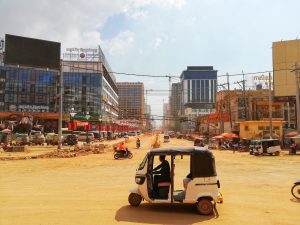SIHANOUKVILLE — The Cambodian government has been told to urgently address “a crisis of forced labor, slavery and torture” after warnings were issued by at least five Asian embassies amid persistent reports detailing kidnapping and extortion rackets, particularly on this country’s south coast.
Thirty-five civil society groups said reports indicated that thousands of people, mostly foreign nationals, had found themselves trapped in large compounds and forced to work after being kidnapped, sold, trafficked, or tricked into accepting jobs in Cambodia.
“Workers who escape report having faced physical and mental threats and violence at the hands of their captors,” they said in a joint statement, calling for a coordinated mass response between the Cambodian and foreign governments, and international organizations including the United Nations.
Most of the alleged victims were put to work in online scamming operations, targeting foreign nationals who live outside the country, primarily based from here in the southern port town of Sihanoukville, which has a long held a reputation as a notorious haven for criminals who operate with impunity.
That notoriety has compounded since the mid-2010s as Chinese investors have spent billions of dollars transforming the provincial capital into a gambling metropolis.
Similar abuses were also reported in the capital Phnom Penh, and in provinces including Pursat and Koh Kong.
The group of 35 organizations – including Adhoc, the Cambodian Center for Human Rights, Licadho, the International Justice Mission, and Transparency International – added that the embassies of Indonesia, Vietnam, Thailand, Pakistan, and China had all issued warnings about the situation.
“The government should fully investigate and abolish all compounds linked with illegal gambling and fraud operations and associated forced labor, slavery or torture,” the statement said.
“The continued existence of these operations is a tragedy, and we are horrified that Cambodia is being used as a base for such inhumanity. All relevant actors must immediately guarantee that no one is subject to slavery or torture within Cambodia.”
Last month, more than 160 Indonesians were rescued by Cambodian authorities. Among them a group 44 who were “traded like cattle” within a syndicate of Chinese companies and forced into scamming people through online gambling syndicates.
A report by the Khmer Times found, “If the recruited workers failed to reach the bare minimum, their lives became a living hell. In order to leave the company, the syndicate operators demanded that the workers or their families pay between $3,000-$5,000 as compensation money.”
Another widely circulated report told how a Chinese man claimed he had been imprisoned and had his blood drained and sold by a gang in Sihanoukville. But Cambodian police have told the Chinese embassy in Phnom Penh that the “blood slave case” was a hoax.
In response Minister of Interior Sar Kheng has put criminals on notice, warning he will put an end to such crimes in Sihanoukville before the mid-year commune elections. But also said that he had rejected a request from the Chinese government for special powers to arrest its own nationals involved in criminal activity.
“The above proposal of the Chinese side is not acceptable,” he said. “If we give this sovereignty to China, it will also be given to other countries that have offices in Cambodia.
“There are quite a few countries.”
Sar Kheng was also wary of the damage Sihanoukville was causing to Cambodia’s international standing, saying that “when images of crimes happening in Cambodia are spread around the world, people would wonder why Cambodia is so bad.”
It was an important point with image-conscious Cambodia increasingly under the regional diplomatic spotlight after taking on the role as chair of the Association of Southeast Asian Nations (ASEAN) in 2022 and holding commune elections on June 5.
Next year it will stage the Southeast Asian Games and conduct national elections, while Prime Minister Hun Sen has announced he will soon retire and is promoting his eldest son, Hun Manet, as his successor.
The group of 35 civil society groups did say that Cambodian authorities had responded to some individual complaints, adding, “this crisis cannot be resolved on a case-by-case basis” while urging the state to “investigate alleged complicity between some government authorities and the criminal enterprises.”
There is much at stake.

































